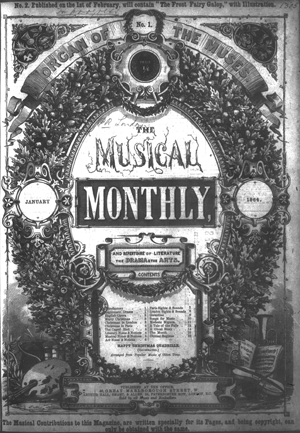The Musical Monthly and Repertoire of Literature, the Drama, and the Arts
- Complete Introduction: English

Prepared by Richard Kitson and Randi Trzesinski
Introduction by Richard Kitson
1 volume* (2006)

Twenty-one issues of The Musical Monthly and Repertoire of Literature, the Drama and the Arts [MMO] containing articles about music and literature, reviews of operas, concerts, published music, books and sheet music—was published monthly in London from 1 January 1864 until 1 September 1865. The name of the principal editor is not given. William Vincent Wallace (1812-65) is named as responsible for selecting and editing the music offered in the MMO monthly supplements.
The issues of the first seven numbers of MMO are organized in three main sections. The first contains editorials, feature articles, and essays, all of which are unsigned. Following these are several columns, found in various orders, and not all of which are included in every issue. These columns are generally reviews covering topics such as literature, music, art, and the musical life of Paris and London. The final section contains fictional serials, poetry, and “Songs for Music,” printed poetry written for possible musical treatment. Beginning in Volume I, no. 8, the journal’s contents replace reports and commentary on musical life with fictional serials and poetry. Among the musical supplements are popular dances of the period—the quadrille, mazurka and waltz—songs and ballads, the words and music of a complete operetta, Polly’s Bandbox, Robert Schumann’s Arabesque, Op. 18, Frederic Chopin’s Valse, Op. 64, No. 1, and a fantasia based on melodies from Carl Maria von Weber’s opera Euryanthe.
The articles treat a number of topics including the problems preventing the success of English opera, Lady Wallace’s translations of selections from Mendelssohn’s letters, the Shakespeare tercentenary, music set to Shakespeare’s texts and incidental music composed for his dramas, Joseph Kremer’s lectures on music theory, Chorley’s translation of the libretto of Gounod’s Faust, and Walter Scott and Scottish minstrelsy. There are also biographical sketches of Haydn and Meyerbeer.
An extensive review of Ellen Greathorne Clayton’s The Queen’s of Song, includes discussion of many celebrated nineteenth-century singers, including Jenny Lind-Goldschmidt (in the role of Alice in Meyerbeer’s Robert le Diable). Another review considers Benjamin Lumley’s Reminiscences of the Opera, an important source for information about the Italian opera and singers at Her Majesty’s Theatre. Operas new to and currently on the London stage—George Alexander Macfarren’s She Stoops to Conquer and Helvellyn, Gounod’s Mireille and Michael William Balfe’s The Sleeping Queen—are reviewed in detail, with summaries of their plots and analysis of their individual numbers.
Reviews of operatic performances at Her Majesty’s Theatre, the Royal Italian Opera and the Royal English Opera Company at the Covent Garden Theatre feature notices about important singers of the period, including Mario, Sims Reeves, Thérèse Tietjens, Charles Santley, Louisa Pyne and William Harrison. Reviews of performances include those at the foremost British institutions of London: the National Choral Society, the Sacred Harmonic Society, Henry Leslie’s choir, the Monday Popular Concerts, the Crystal Palace Concerts and Adolphe Jullien’s promenade concerts.
Reviews of newly-published music offer opinions about a great variety of instrumental compositions—primarily pianoforte drawing-room pieces, transcriptions of songs and selections from popular operas—and vocal compositions—primarily popular songs, ballads, Church Psalmody edited by the Rev. B. F. Carlyle, a pointed Psalter by J. M. Bentley and cantatas by G. B. Allen (Harvest Home) and Virginia Gabriel (Dreamland and Graziella).
* Hard bound with
- The New Musical Magazine, Review, and Register (London, 1809-1810)
- The English Musical Gazette; or, Monthly Intelligencer (London, 1819)
